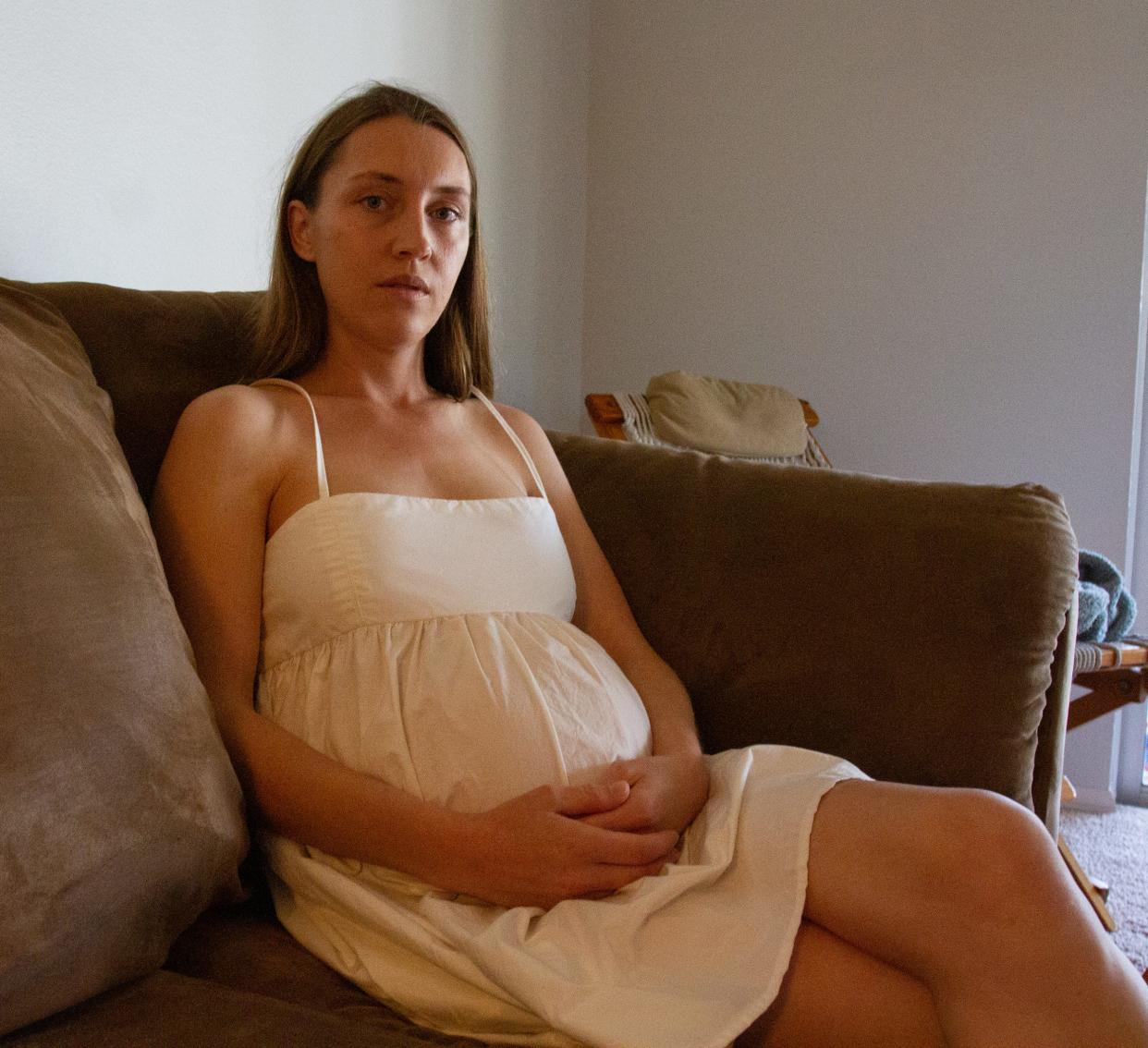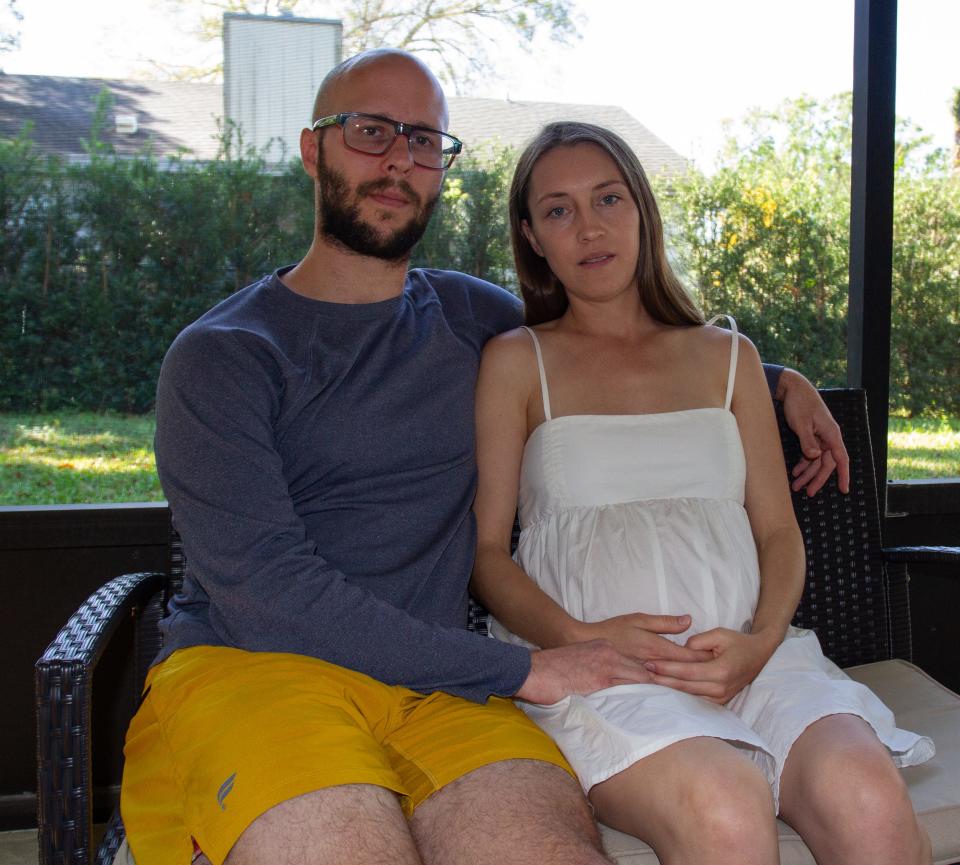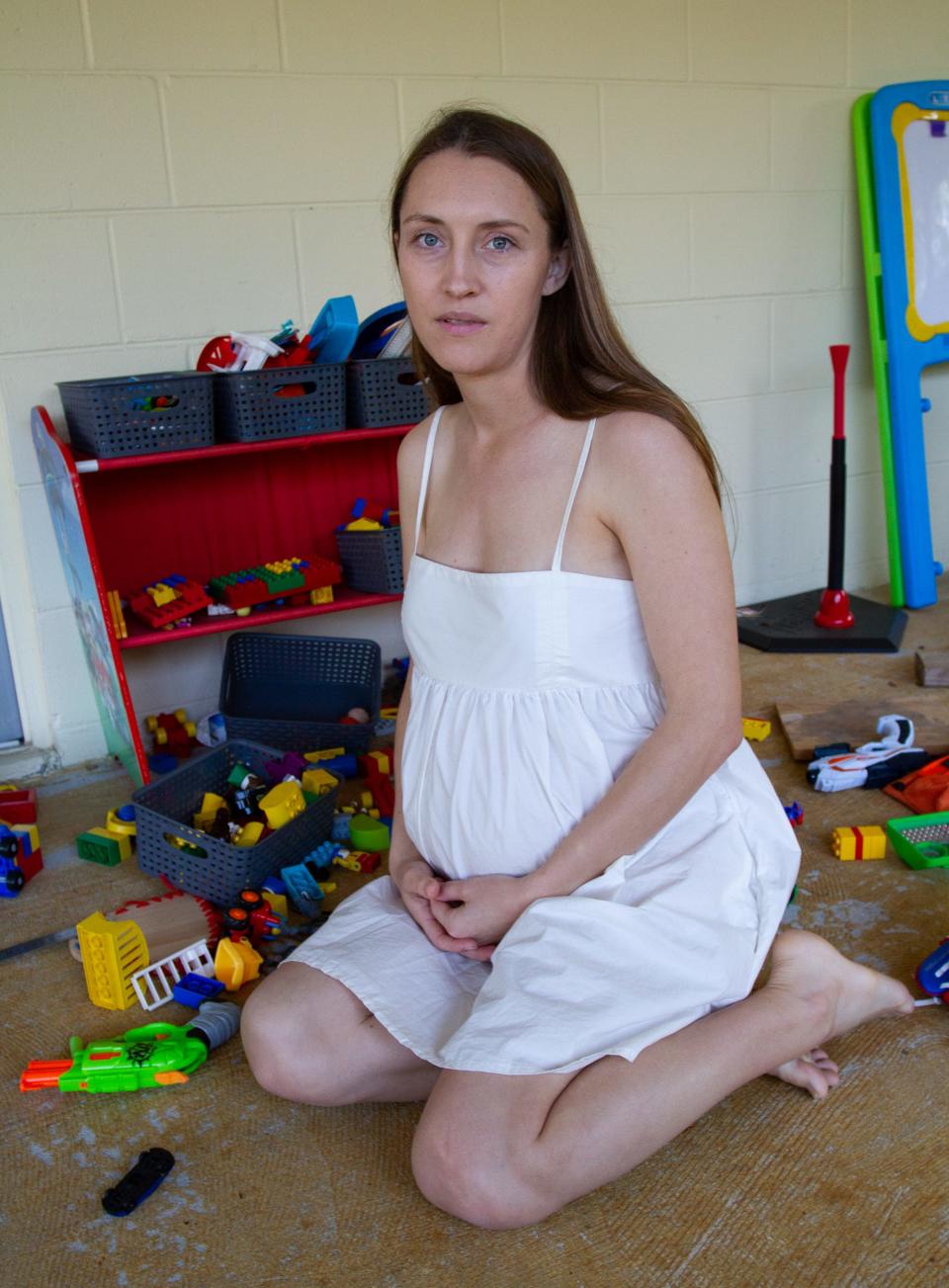Told fetus won't survive, Lakeland woman learns medical center won't terminate pregnancy

LAKELAND — Deborah Dorbert has gone from anticipating the birth of a second child to becoming an example of the uncertainty surrounding the 15-week abortion ban Florida adopted last year.
Dorbert learned on the day before Thanksgiving that her pregnancy had developed a serious complication. A doctor soon diagnosed her with Potter syndrome, a condition in which the fetus does not receive sufficient amniotic fluid and does not develop normal kidneys and lungs.
Doctors told Dorbert, then 23 weeks pregnant, that her baby would not survive for more than a few hours after birth. With about four months remaining in her pregnancy, Dorbert and her husband, Lee, decided they wanted to terminate the pregnancy as soon as possible.
That’s when the couple’s wishes ran up against a law passed last year by the Florida Legislature that prohibits abortions after 15 weeks of pregnancy, with limited exceptions. The law, officially titled Reducing Fetal and Infant Mortality, allows exceptions for cases in which two doctors certify in writing that the fetus has a fatal abnormality and has not reached viability, generally considered to be at 23 to 24 weeks of gestation.
By the time Dorbert learned that Lakeland Regional Health would not approve prematurely inducing labor to terminate her pregnancy, citing the months-old Florida law, her pregnancy was past the viability threshold.
Denied an abortionFlorida organizations offer opinions on plight of Lakeland woman
More:Out-of-state patients seeking abortions in Lakeland
OverturnedPolk residents react with thanks, dismay to Roe v. Wade decision
“It was just like a punch to the stomach because we knew I still had another couple of months because I was only at like 26 weeks,” Dorbert, 33, said Wednesday morning at her home in South Lakeland. “I got frustrated, and I got angry because I’m dealing with the physical pain and mental health stuff. I go to doctors for medical advice and to treat me, but yet they can't because somewhere, somebody else created this law that stops them from being able to treat.”
Dorbert’s plight gained nationwide attention when the Washington Post recently published a lengthy article detailing her inability to have the pregnancy terminated. Dorbert said the newspaper’s reporter contacted her primary care physician, Dr. David Berger of Tampa, after seeing social media postings he had made about her situation, without identifying her.
Lee and Deborah knew that they would be opening themselves up to potential social-media attacks by sharing their story with a national publication, but they decided it was worth whatever backlash might come.
“If we could bring awareness to these laws and just kind of this pregnancy journey, because if we can help another mom going through a similar situation — or any situation with pregnancy — if we can help her then good came of sharing what I'm going through,” Deborah said. “So that's kind of why we decided to tell it. I mean, no one understands these laws and how they affect a woman and her pregnancy.”
Implications of Florida law
The Florida Legislature passed the 15-week ban last year, and Gov. Ron DeSantis held a news conference in Kissimmee in April to announce his signing of the law, championed by then Florida Sen. Kelli Stargel, R-Lakeland, who stood behind him at the event. The law took effect in July.
Stargel, the Senate sponsor of the 15-week abortion ban, suggested that Dorbert’s medical team misinterpreted the law. Stargel, no longer in office because of term limits, said the law clearly establishes an exception for cases of fatal fetal abnormalities that didn’t previously exist. Based on her reading of the Washington Post story, she said that should apply to Dorbert.
“Her situation is exactly why we had that exemption within the law for a fatal fetal abnormality,” Stargel said. “So it's unfortunate that the doctors are being extremely cautious, which is often the case. Doctors are concerned about being sued or doing something inappropriate, but I believe the law is clear and that she should be able to terminate her pregnancy any time in the pregnancy.”
The 15-week abortion law defines a fatal fetal abnormality as “a terminal condition that, in reasonable medical judgment, regardless of the provision of life-saving medical treatment, is incompatible with life outside the womb and will result in death upon birth or imminently thereafter.”

Dorbert, who has lived in Lakeland since 2013, said her pregnancy seemed entirely normal until she went for a routine ultrasound appointment in November to receive what’s known as an anatomy scan. She noticed an abrupt change in the facial expression of the technologist, who left the room and returned with the obstetrician.
As the doctor explained, the ultrasound showed that her uterus lacked amniotic fluid, a byproduct of fetal urine that is crucial to organ development and also cushions the fetus in the womb. Without sufficient fluid, the fetus would not develop kidneys, Dorbert was told.
Dorbert spent Thanksgiving in Lakeland Regional Health Medical Center before being referred to a maternal fetal medicine specialist. Further testing confirmed that the only hope for the fetus’ survival would be a kidney transplant after birth.
Potter syndrome affects one in 4,000 to 10,000 births, according to the Cleveland Clinic. The syndrome has different forms and causes, and Dorbert’s variation is considered incompatible with life after birth.
A doctor told Dorbert her options were to have labor induced prematurely or to carry the fetus to term. She and Lee quickly decided they wanted to induce labor as soon as possible.
“And so, that's when he mentioned the law was going to come into play,” Dorbert said.
Her obstetrician said he would have to consult with the administration at Lakeland Regional Health. Dorbert waited a few weeks before learning just before Christmas that the legal department had vetoed the procedure. She was told premature induction of labor could be done at that stage of pregnancy only if the condition threatened her life.
Lakeland Regional Health emailed a statement from Timothy Boynton, the chief public relations and communications officer:
“Lakeland Regional Health and its physicians honor the privacy and health of each patient. As an organization, Lakeland Regional Health upholds the responsibility to care for each individual patient while abiding with all local, state, and federal laws.”
Dorbert said she considered going out of state to terminate the pregnancy, but she faced a combination of obstacles, including the expense and her unfamiliarity with any doctors in other states. Dorbert, who has a 4-year-old son, also feared she might face legal repercussions.
Stargel sponsored a series of bills during her 14 years in the Legislature aimed at restricting abortion. She said she doesn’t think that DeSantis and Florida’s Republican-led Legislature have created an atmosphere in which doctors are afraid to perform some abortions that might actually be allowed by law.
“We just changed the law to move from 24 weeks to 15, and in doing so, there's always a caution,” Stargel said. “But I believe it's very clear. Prior to our bill of having the 15-week (limit), there was a 24-week abortion ban and there didn't seem to be concerns. Frequently, these abnormalities are discovered after 24 weeks. So I don't know why we're hearing about them so much now, when actually we have an exemption now that didn't exist at 24 weeks.”
DeSantis’ office did not respond to an emailed request for comment.
Pain and depression
Dorbert’s original due date was March 20. She was scheduled to visit her obstetrician Thursday, and she hoped to have labor induced next week, when she will be 37 weeks pregnant. That's when the pregnancy will be considered early full term.
As she sat at her dining room table, frequently cupping her rounded belly, Dorbert worried that early induction could prompt a Cesarean section, a procedure she wanted to avoid.
In the three months since her diagnosis, Dorbert has endured physical and emotional misery. The lack of amniotic fluid in her womb means that the fetus pushes against her hip bones, pelvis and ribs, causing constant pain.
Dorbert grew tearful at times as she discussed her ill-fated pregnancy.
“It’s kind of hard to feel life and then know that once you deliver it, they're going to pass,” she said. “So it just hasn't been easy. I mean, it’s been painful. And so I have a lot of times that I break down, just trying to figure out, ‘How come I’m going through this?’ ”
Dorbert said she copes daily with depression and anxiety. She is seeing a therapist, but doctors can’t prescribe her any medications while she is pregnant.

Meanwhile, she has to wake at 6:30 a.m. every day to prepare her son, Kaiden, for preschool.
“He still needs me here, even though I'm in pain and dealing with all that depression,” Dorbert said. “And he doesn't understand. I mean, he sees me sad and whatnot.”
Dorbert and her husband were just at the point of starting to prepare a nursery in their house when she had her fateful ultrasound appointment. Kaiden has been excited about his mother’s pregnancy and has hoped for a baby sister.
“We are still trying to find a positive way to tell him, so we haven't told him yet,” Dorbert said. “We’re getting close to having to tell him that his sibling that he talks about and wants isn't coming home.”
The sex of the fetus was not apparent in early ultrasounds, and the Dorberts are waiting until delivery for that to be revealed. They have chosen two names: Milo for a boy and Malia for a girl.
“It’s been hard,” Lee said. “We’ve tried to turn our focus onto the positives. We’ve tried to turn our focus onto, you know, treasuring the heartbeats that we do have and making sure that Baby M feels all the love that we can. So we try to focus our energy into that.”
Deborah, a slender woman with brown hair and gray eyes, attracts attention for her swollen belly when she is in public.
“It’s been hard because you go out and see people and they see you're pregnant and they ask you how (far) along you are and the sex,” she said. “I’m always like, ‘Yes, I’m pregnant, but no, because the baby has a life-threatening condition.’ And their demeanor changes and they're saying, ‘I'm going to pray for you,’ or just, ‘I'm sorry,’ and sending their sympathy.”
Dorbert said her doctors have told her the instance of Potter syndrome is not genetic and that she could likely have a normal pregnancy in the future.
She said it’s too soon to decide whether she will pursue another pregnancy.
“My husband would love to have another one, but he also knows how hard this has been on me,” she said. “So he understands if I don’t want to try for another one. If you asked me right now if I want another one, I’d say no. We haven’t been able to grieve yet. Hopefully, in time I can change my mind and I’ll heal and feel differently.”
Unlikely abortion activist
Dorbert learned she was pregnant about two months after the U.S. Supreme Court issued its ruling in Dobbs v. Jackson, overturning the 1973 decision that had established a nationwide right to an abortion. Though she was raised as a Catholic, Dorbert said she has long believed that women, guided by their doctors, should be free to decide on ending a pregnancy.
“I always felt like it should be left up to the mother's choice, and her health care providers,” she said. “I can’t judge, and I don't know everyone's situation or what they're going through.”
Lee said they had little hesitation in agreeing to do the Washington Post article, even though they realized it could bring unwanted attention. He said his main concern was that some would “take advantage of the story to be able to obviously push a certain agenda.”
“We decided that if it helps one other person, if it reaches one other mom that's going through something similar that feels like they're alone, or they're on an island, they're not,” he said. “If it helps them find the strength to continue on — because I know from watching her that it’s not easy.”
Deborah said she is not active on social media and has avoided looking for commentaries since the Washington Post article published. She said the reporter, Frances Stead Sellers, has shared emails from readers expressing empathy and support.
As Deborah sat in her house, tearfully discussing her ordeal, a twice-weekly demonstration was taking place about three miles away at the Lakeland Women’s Health Center, the only clinic in Polk County that performs abortions, aside from emergency situations.
About 20 people gathered in front of the clinic Wednesday morning, with one holding a large sign that read, “Child sacrifice center.” Another displayed a sign showing what appeared to be a picture of an aborted fetus. At least one demonstrator held a sign that declared, “Keep abortion legal.”
“This has been a hot topic for a long time,” Lee said. “I never thought I would be in a position to be (involved with) an abortion myself or for my loved ones. But I would never have passed any judgment on anybody to make that decision. I always thought that the kind of the mental state that a woman has to be in in order to make that decision is not something to take lightly.”
Deborah said that abortion laws are often devised by men, who will never undergo a pregnancy. She also noted that the Florida Legislature is expected to consider a six-week abortion ban in the annual session that begins March 7.
“I would have never imagined I would be put in in the middle of this,” she said, “because the laws change — and they're about to change again in March, from what I've been told. And you’re kind of right dab in the middle of all these new law changes, and no one knows how to interpret them.”
Gary White can be reached at gary.white@theledger.com or 863-802-7518. Follow on Twitter @garywhite13.
This article originally appeared on The Ledger: Despite fetal condition, Lakeland woman can't terminate pregnancy

